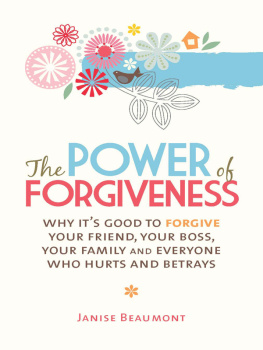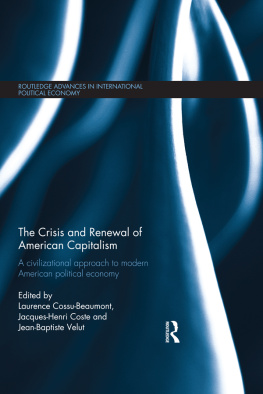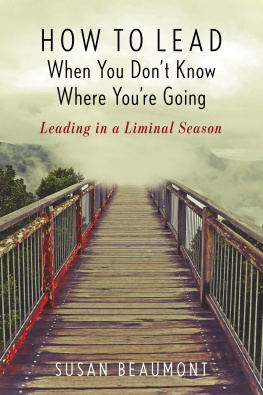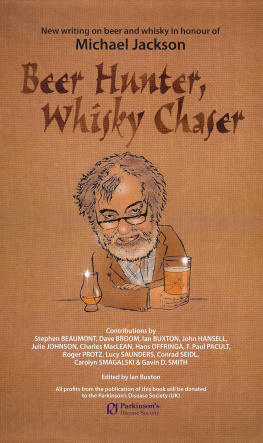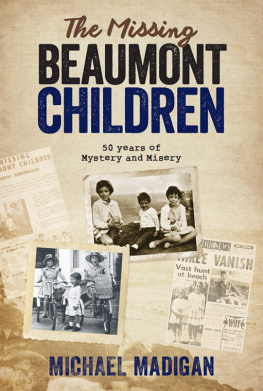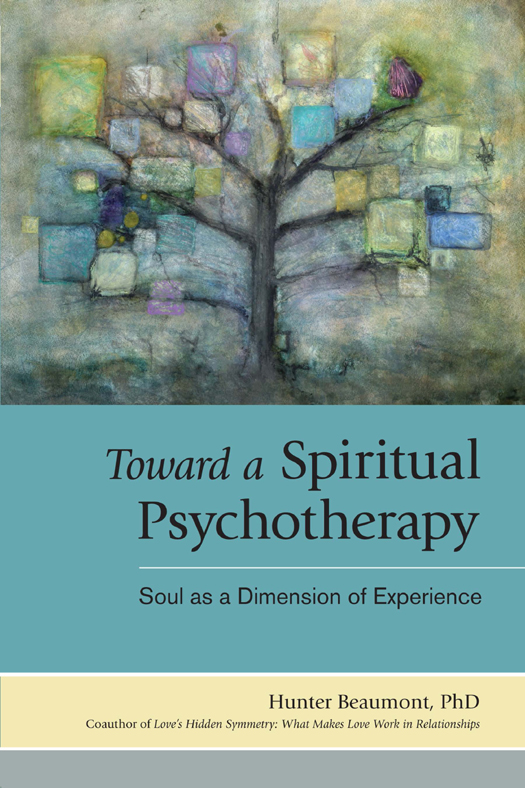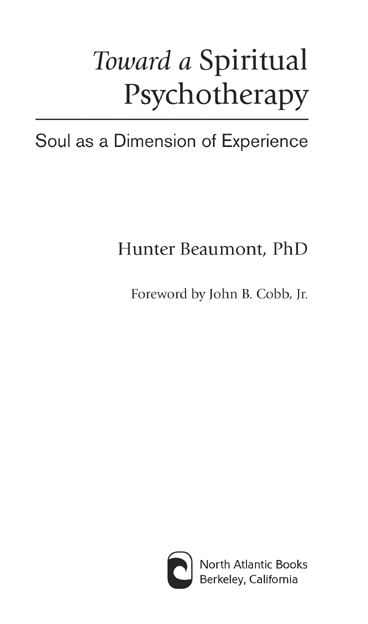Copyright 2012 by Hunter Beaumont. All rights reserved. No portion of this book, except for brief review, may be reproduced, stored in a retrieval system, or transmitted in any form or by any meanselectronic, mechanical, photocopying, recording, or otherwisewithout the written permission of the publisher. For information contact North Atlantic Books.
Original title: Auf die Seele schauen. Spirituelle Psychotherapie by Hunter Beaumont 2008 by Ksel-Verlag, a division of Verlagsgruppe Random House GmbH, Mnchen, Germany
| Published by |
| North Atlantic Books | Cover art iStockphoto.com/philsajonesen |
| P.O. Box 12327 | Cover design by Suzanne Albertson |
| Berkeley, California 94712 |
Toward a Spiritual Psychotherapy: Soul as a Dimension of Experience is sponsored by the Society for the Study of Native Arts and Sciences, a nonprofit educational corporation whose goals are to develop an educational and cross-cultural perspective linking various scientific, social, and artistic fields; to nurture a holistic view of arts, sciences, humanities, and healing; and to publish and distribute literature on the relationship of mind, body, and nature.
North Atlantic Books publications are available through most bookstores. For further information, visit our website at www.northatlanticbooks.com or call 800-733-3000.
Library of Congress Cataloging-in-Publication Data
Beaumont, Hunter.
Toward a spiritual psychotherapy : soul as a dimension of experience /
Hunter Beaumont.
p. cm.
Includes bibliographical references.
eISBN: 978-1-58394-385-4
1. PsychotherapyReligious aspects. 2. Spirituality. 3. Soul. I. Title.
RC489.S676B43 2012
616.8914dc22 2011016258
v3.1
DEDICATION
I have had the good fortune to have studied with great teachers. Some I have known only through their writings. Others have patiently given their time and attention to me as I struggled to liberate and live the dimension of soul within my own life. I would like to mention a few of the most important by name.
Allan Hunter, minister, namesake, deceased
John B. Cobb, process theologian, scholar, teacher
Bob Resnick, gestalt therapist, teacher, and friend
Kemal Erkmen, Sufi, deceased
Hameed Almaas and Karen Johnson, founders of the Diamond Approach
Colleen Beaumont, life partner and friend
I hope to return their generosity by passing on the fruits of what I have received.
CONTENTS
Foreword
The line between psychotherapy and spiritual direction has blurred over the years in the hands of some practitioners. In the hands of Hunter Beaumont, it disappears altogether. It does so because of his remarkable reintroduction of soul into his thought and practice. This is a bold move. Its value and importance depend on the clarity of the meaning of soul and the demonstration that attending to it is not just continuing what has long been done with different terminology but actually bringing to focus an aspect of the psychic life that has been neglected. Readers will come to their own conclusions about these matters. I confess that at first I thought that soul referred to the emotional life, understood in a somewhat expanded way. I found this interesting, but I did not see it as a major break from the past. Gradually, the difference between soul and the emotional life became clearer to me, and I was struck by the profound originality and importance of the project.
In the analysis of the psychic life, we should not look for too much precision. It does not organize itself into neat compartments. Everything that happens in actual human experience affects everything else. Further, Beaumont approaches matters as a healer, not a philosopher. His definitions direct our attention in certain ways; they do not strictly define. He makes this explicit at the end of the first chapter by reminding the reader that his use of soul is a vehicle for supporting discovery and learning, not a final, formal definition. Defining soul in this soft way makes clear that much that is of great actual importance for human well-being has been neglected or marginalized by both psychotherapists and spiritual directors.
The distinction between soul and emotion comes through clearly in the discussion of hate. Of course, hate can point to an emotion that has importance, but another aspect is even more interesting. I would describe it as a closing off of natural empathy. One blocks any contribution of the others feelings to ones own. One makes oneself, or is made by circumstances, to be indifferent to the suffering of another even in the presence of that other. One thereby shrinks ones soul. In biblical language, one hardens ones heart.
Another particularly illuminating point is the clear distinction between the relational aspect of soul and the individualist focus of most spiritual practice as well as psychotherapy. The quest for inner serenity that is largely a matter of inner psychic discipline is not disparagedBeaumont has personally found help in itbut he sees that its focus is away from relationships, and he argues that soul is fundamentally relational. Others participate in constituting our souls as we participate in constituting theirs. Our suffering at the level of soul is largely suffering that has arisen in these relationships: Sometimes the empathetic inclusion of the other introduces pain, at other times pain arises because empathetic inclusion is blocked or distorted.
Defining soul in this relational way allows a radical openness to those with whom he works. Beyond his assumption that many of those who come to him have wounded or undeveloped souls, Beaumont imposes no common pattern upon them. How soul can become healthier is a matter to be worked out in each individual case. Almost always it helps to become aware of how and where it has been hurt, but there is no common recipe for how this can happen and no irresponsible guarantee that it can heal at all. The heart of the book are the true stories from the lives of people living in different countries, speaking different languages, and adhering to different faiths. Like the people, each story is different.
Beaumont does observe that soul yearns for health and that we can help one another to remove some of the obstacles that block the path to health. In this sense, he is on the side of those who hold that human nature is good. But soul understood in this way is not only eternally inviolable, it is also utterly vulnerable. From infancy on, it often has to protect itself by actions that harden or wound it. Even the best parents are unable to avoid disappointing the infant soul. Most of us also inflict avoidable injuries upon our children because our own souls have been damaged. We are all wounded, and we all wound. This is the human condition. Our goal is to wound less and heal more.
As I mentioned, the book speaks primarily through stories. As a result, much of the radical shift in understanding it offers remains implicit. I am a philosophical theologian and in that orientation, I offer explicit generalizations. Other readers will prefer to stay with the stories or will generalize differently. That is all to the good.
The philosophy that seems most adequate to me is that of Alfred North Whitehead. The rich welter of data offered in this book makes far more sense in Whiteheads vision of reality than in the now dominant one our culture in general has appropriated from Descartes and Kant. For this reason, I offer a very brief hint at one of the relevant ideas from Whiteheads perspective. I will not attempt in this foreword to introduce the reader to Whiteheads highly complex and technical philosophy, but merely point to the relevance of his perspective for understanding the material presented in this book.



